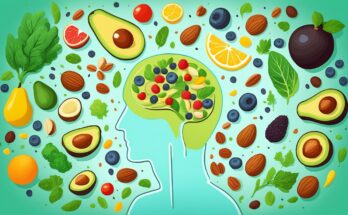Many of us strive to maintain a healthy lifestyle by including fiber-rich foods in our diet. Fiber offers numerous benefits, from promoting digestion to supporting heart health. However, is there such a thing as too much fiber? Let’s explore the side effects and risks associated with excessive fiber intake.
Key Takeaways:
- Consuming excessive fiber can lead to various side effects and health risks.
- Common symptoms of fiber overdose include bloating, gas, and abdominal discomfort.
- Potential health problems from excessive fiber consumption include nutrient deficiencies and gastrointestinal disorders.
- High fiber intake can impact digestive health both positively and negatively.
- To maintain optimal health, it is important to strike a balance in your fiber intake.
Understanding Fiber Intake Guidelines
Before diving into the effects of excessive fiber consumption, it’s important to understand the recommended guidelines for fiber intake. By following these guidelines, you can ensure that you consume an appropriate amount of fiber to support your overall health.
Fiber is an essential nutrient that plays a crucial role in maintaining a healthy digestive system. It aids in proper digestion, prevents constipation, and helps regulate blood sugar levels. However, just like with any nutrient, it’s important to consume fiber in moderation.
Recommended Daily Fiber Intake
According to experts, the recommended daily fiber intake for adults is between 25 to 38 grams per day. This guideline can vary based on factors such as age, gender, and overall health. For children, the recommended fiber intake is lower but still essential for their growth and development.
Meeting the recommended daily fiber intake is relatively achievable by incorporating a variety of fiber-rich foods into your diet. Fruits, vegetables, whole grains, legumes, and nuts are all excellent sources of dietary fiber.
| Fiber-Rich Foods | Fiber Content per Serving |
|---|---|
| Avocado (1 medium) | 9 grams |
| Chia Seeds (1 ounce) | 10 grams |
| Black Beans (1 cup, cooked) | 15 grams |
| Quinoa (1 cup, cooked) | 5 grams |
Remember that it’s important to gradually increase your fiber intake and drink plenty of water to aid in digestion. Sudden or excessive fiber consumption without adequate hydration can lead to discomfort and digestive issues.
Now that we’ve established the recommended daily fiber intake, let’s explore the potential impacts when this limit is exceeded.
Common Symptoms of Fiber Overdose
Consuming too much fiber can have various effects on your body. It’s important to recognize the signs of fiber overdose to maintain your digestive health. Here are some common symptoms to watch out for:
- Bloating: Excessive fiber intake can cause bloating, leading to discomfort and a feeling of fullness.
- Gas: Consuming too much fiber can result in increased gas production, leading to flatulence and abdominal bloating.
- Abdominal Discomfort: Overdoing it on fiber can cause abdominal pain, cramping, and discomfort.
If you experience any of these symptoms after consuming high amounts of fiber, it is possible that you have exceeded your body’s tolerance level. It’s important to adjust your fiber intake to ensure your digestive system functions optimally.
Fiber Intake and Individual Tolerance
It’s essential to note that each individual’s tolerance to fiber can vary. Some people may be more sensitive to its effects, while others may have a higher threshold. Paying attention to your body and its response is key to finding the right balance in your fiber consumption.
Next, we will explore the potential health problems that can arise from excessive fiber consumption and how it can impact your overall digestive health.
Potential Health Problems from Excessive Fiber Consumption
Excessive fiber intake can have adverse effects on your health. While fiber is essential for digestive health, consuming too much can lead to various health problems and complications. It is important to be aware of the dangers of excessive fiber consumption to maintain a balanced and healthy lifestyle.
Nutrient Deficiencies
One of the potential health problems associated with consuming excessive fiber is the risk of nutrient deficiencies. Fiber-rich foods can interfere with the absorption of certain nutrients, such as iron, calcium, zinc, and magnesium. This can result in deficiencies and impact overall health and well-being. It is crucial to ensure a varied and balanced diet that includes sources of essential nutrients.
Bowel Obstructions
Another danger of excessive fiber consumption is the possibility of bowel obstructions. When you consume a large amount of fiber without adequate fluid intake, it can cause the fiber to accumulate and form a mass in the digestive tract. This can lead to blockages and cause symptoms such as severe abdominal pain, bloating, and constipation.
Gastrointestinal Disorders
Consuming excessive amounts of fiber can also contribute to gastrointestinal disorders. In some individuals, an overload of fiber can lead to symptoms such as bloating, gas, cramping, and diarrhea. These symptoms can be disruptive and uncomfortable, affecting daily activities and overall quality of life. It is important to listen to your body and make adjustments to your fiber intake if you experience any gastrointestinal discomfort.
To ensure optimal health, it is essential to consume fiber within the recommended guidelines and listen to your body’s needs. While fiber is important for overall health, excessive consumption can have negative consequences. Striking a balance in your fiber intake and consulting with a healthcare professional can help you avoid the potential health problems associated with too much fiber.
The Impact of High Fiber Intake on Digestive Health
When it comes to fiber intake, it’s important to find the right balance. While fiber plays a crucial role in promoting regular bowel movements and maintaining overall digestive health, consuming excessive amounts can have negative effects.
One of the main benefits of fiber is its ability to add bulk to stool, which helps to prevent constipation and keep the digestive system running smoothly. However, when you consume too much fiber, especially without adequate hydration, it can lead to digestive discomfort, including bloating, gas, and abdominal pain.

A high fiber diet can also interfere with nutrient absorption. Fiber has the potential to bind to certain minerals, such as iron, zinc, and calcium, making them less available for your body to absorb. This can lead to nutrient deficiencies over time and negatively impact your overall health.
“Consuming excessive amounts of fiber without balancing it with other essential nutrients can have unintended consequences on your digestive health and overall well-being.” – Dr. Kelly Miller, Gastroenterologist
It’s important to note that the negative effects of high fiber consumption vary from person to person. Some individuals may be more sensitive to excessive fiber intake than others. If you experience digestive discomfort or other negative symptoms after increasing your fiber intake, it may be wise to consult with a healthcare professional or registered dietitian.
To ensure a healthy digestive system, aim to gradually increase your fiber intake and diversify your sources of dietary fiber. This can help you avoid the negative effects of consuming too much fiber while still reaping the benefits it provides.
Balancing Your Fiber Intake for Optimal Health
To maintain optimal health, it is crucial to strike a balance in your fiber intake. While fiber is an essential nutrient that offers numerous health benefits, consuming excessive amounts can pose risks to your digestive system and overall well-being.
Gradually Increase Your Fiber Intake
When it comes to fiber consumption, moderation is key. It is recommended to gradually increase your fiber intake over time. Doing so allows your body to adjust to the increased fiber load, minimizing the risk of digestive discomfort and potential side effects. Start by adding small increments of fiber-rich foods to your diet and gradually increase the portions.
Diversify Your Sources of Dietary Fiber
Diversifying your sources of dietary fiber is another important strategy for balancing your fiber intake. Instead of relying solely on one type of fiber-rich food, try incorporating a variety of fruits, vegetables, whole grains, legumes, and nuts into your meals. This not only provides you with a broader range of nutrients but also helps prevent excessive intake of a specific type of fiber.
Listen to Your Body
It’s essential to listen to your body and pay attention to how it responds to your fiber intake. If you experience discomfort, bloating, or other digestive issues, it may indicate that you are consuming too much fiber. Give your body time to adjust, and consider reducing your fiber intake if necessary.
| Fiber-rich Foods | Fiber Content per Serving |
|---|---|
| 1 medium avocado | 9 grams |
| 1 cup cooked lentils | 15.6 grams |
| 1 medium pear | 5.5 grams |
| 1 cup cooked quinoa | 5.2 grams |
Remember, your fiber intake should be well-balanced and suited to your individual needs. It’s always advisable to consult with a healthcare professional or a dietitian to determine the right fiber intake for you and to address any concerns or specific dietary requirements.
By following these tips, you can maintain a healthy balance of fiber in your diet, preventing the risks associated with excessive fiber consumption while reaping the benefits of this essential nutrient.
Conclusion
In conclusion, it’s important to recognize that while fiber is crucial for a healthy diet, consuming excessive amounts can lead to negative consequences. Understanding the potential side effects and risks of overdoing it can help you make informed choices and maintain a balanced and healthy lifestyle.
Exceeding the recommended guidelines for fiber intake can result in symptoms such as bloating, gas, and abdominal discomfort. Moreover, excessive fiber consumption can also lead to health problems, including nutrient deficiencies, bowel obstructions, and gastrointestinal disorders.
To maintain optimal digestive health, it’s essential to strike a balance in your fiber intake. Gradually increasing your fiber intake and diversifying your sources of dietary fiber can help mitigate the risks associated with consuming too much fiber. By finding the right balance, you can enjoy the benefits of fiber while minimizing any potential negative effects.
FAQ
What happens when I take too much fiber?
Consuming excessive amounts of fiber can lead to various side effects and health risks. Common symptoms of fiber overdose include bloating, gas, and abdominal discomfort. It can also cause nutrient deficiencies, bowel obstructions, and gastrointestinal disorders. It’s important to maintain a balanced fiber intake for optimal health.
What are the side effects of excessive fiber intake?
Excessive fiber consumption can result in symptoms such as bloating, gas, diarrhea, and constipation. It can also interfere with nutrient absorption and cause gastrointestinal issues like stomach cramps and stomach bulging. It’s essential to be mindful of your fiber intake and avoid going overboard to prevent these side effects.
What are the risks of consuming too much fiber?
Consuming too much fiber can lead to serious health problems. It may result in digestive issues like bloating, gas, and abdominal pain. Additionally, excessive fiber intake can cause nutrient deficiencies, hinder proper digestion, and lead to bowel obstructions. Balancing your fiber intake is crucial to prevent these risks.
What are the negative effects of high fiber consumption?
High fiber consumption can have both positive and negative effects on digestive health. While it promotes regular bowel movements and aids in maintaining a healthy weight, excessive fiber intake can cause gas, bloating, and abdominal discomfort. It is important to find the right balance in your fiber intake to avoid these negative effects.
What are the symptoms of fiber overdose?
Symptoms of fiber overdose include bloating, gas, stomach cramps, diarrhea, constipation, and abdominal discomfort. It’s important to be aware of these symptoms and adjust your fiber intake accordingly to avoid any negative effects on your digestive system.
What are the dangers of excessive fiber consumption?
Excessive fiber consumption can lead to various dangers. It can interfere with nutrient absorption, causing deficiencies, and hinder the digestion process, resulting in digestive discomfort. It can also lead to bowel obstructions, potentially requiring medical intervention. It is crucial to maintain a balanced fiber intake to mitigate these dangers.
What health problems can arise from consuming too much fiber?
Consuming excessive amounts of fiber can contribute to health problems such as nutrient deficiencies, bowel obstructions, and gastrointestinal disorders. It’s important to be mindful of your fiber intake to avoid these potential issues and maintain optimal health.
How can excessive fiber intake impact digestive health?
Excessive fiber intake can have both positive and negative effects on digestive health. While it promotes regular bowel movements and helps maintain a healthy gut, consuming too much fiber can lead to digestive discomfort such as gas, bloating, and stomach cramps. It is crucial to strike a balance in your fiber intake for optimal digestive health.
How can I balance my fiber intake for optimal health?
To maintain optimal health, it is important to balance your fiber intake. Gradually increase your fiber consumption and diversify your sources of dietary fiber. Incorporate a variety of fruits, vegetables, whole grains, and legumes into your diet. Additionally, drink plenty of water to support digestion. Consulting with a healthcare professional or registered dietitian can also provide personalized guidance in balancing your fiber intake.




